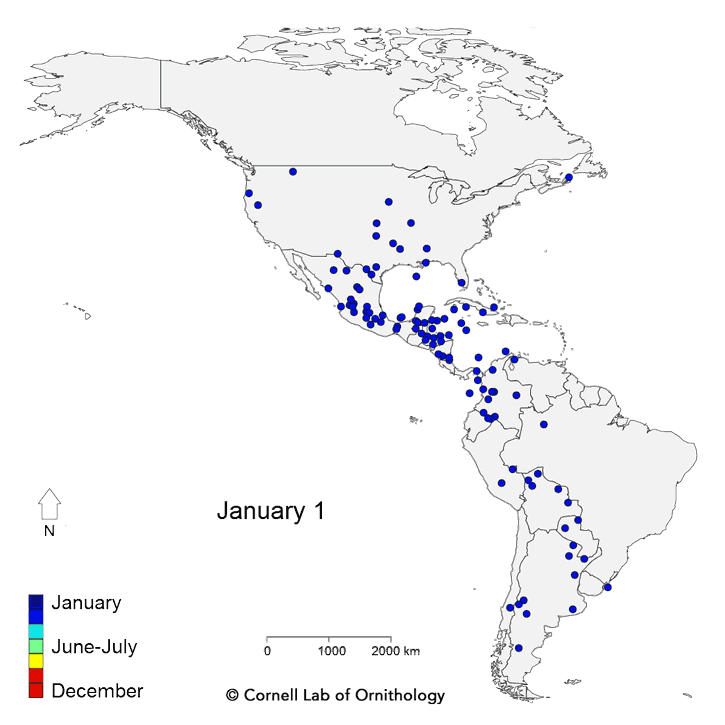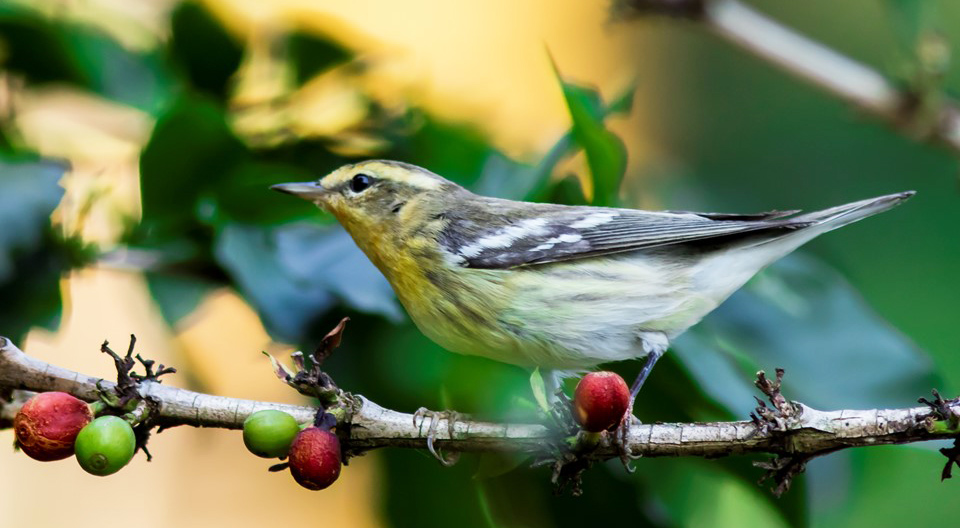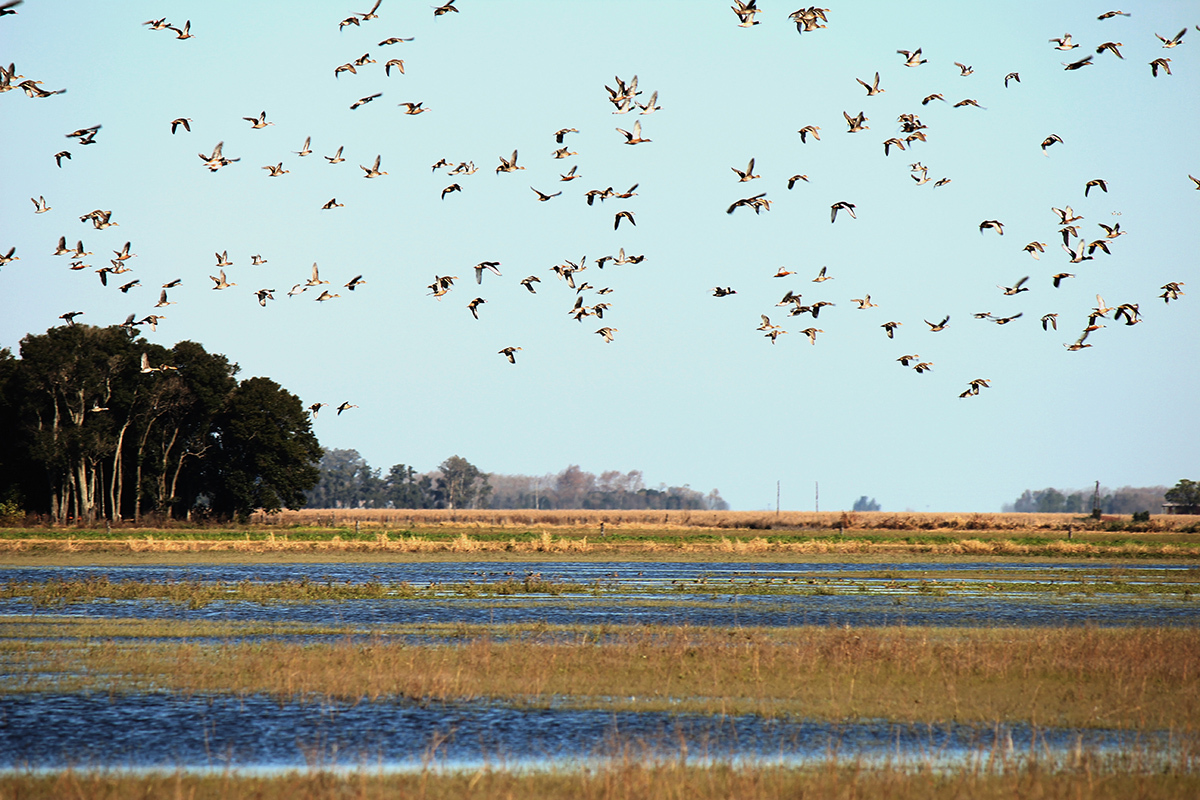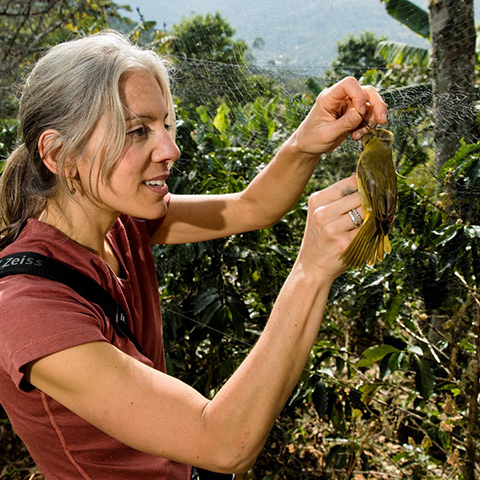Ecologist Studies Bird Migration, Biodiversity, Environment, Communities
Looking for Win-Win Outcomes for People and Planet
For Amanda Rodewald, migratory birds are emblematic of a world on the move. In one year, a single warbler may spend 80 days in boreal forests in Canada, 30 days in the United States, resting and refueling during migration, and more than 200 days in Central America.
Neotropical migratory birds, which breed in North America and winter in Central and South America as well as the Caribbean, are of special interest to Rodewald, an ecologist and conservation biologist. She and her colleagues study birds and the ecosystems on which they depend in order to understand their needs and movements, the impact of human activities and global change on their populations, and ways that we can safeguard the healthy environments they—and we—require.
As part of her work, Rodewald looks for win-win outcomes for people and the planet, and this turned her attention to coffee farms.
Growing coffee under trees—a practice called shade-grown coffee—results in a wide variety of social and environmental benefits.
As she explains, “Whether you care about supporting the livelihoods of farmers, conserving biodiversity, maintaining productive and healthy environments, or enjoying a great-tasting cup of coffee, it all points to shade-grown coffee.”
Coffee and Sustainable Ecosystems
Many migratory birds spend the winter on shade-coffee farms, and they can return to the same farms year after year. But widespread deforestation and agricultural intensification has reduced the amount of suitable habitat for migrating birds and other species. As forests were cleared and as the traditional practice of growing coffee under shade trees gave way to environmentally harmful monocultures of “sun coffee,” migratory birds have suffered. Rodewald says, for example, that the population of one vulnerable songbird species, the small blue-and-white Cerulean Warbler, has declined by 70 percent in the past 50 years, coinciding with the widespread conversion of shade to sun coffee.
“I advocate for the use of science in planning, policy, and decision-making processes.”
Fortunately, shade coffee is starting to make a comeback.
In addition to the idea that more shade-grown coffee farms would be beneficial for birds, Rodewald’s collaborative research is helping show co-benefits for farmers and their families. Trees improve soil health and farm conditions, and the shade-grown coffee beans produced are a higher quality, which can bring the farmer a higher price. With the forest acting as natural fertilizer, there is little need for chemicals, which is a positive impact on water quality. Forests are sustained, not cut down. Coffee plants grown under trees produce beans for two or three times longer than sun-grown coffee plants.
“We’re focused on finding ways to conserve species and protect biodiversity,” she says. “To do that, we need to understand the migratory patterns of birds. We also need to understand the social and economic choices that people make, and what the full impacts of those choices are. Then we can recommend sustainable solutions—changes to systems and resources and incentives at local and global scales—that will contribute to the health of the planet for all species.”
Rodewald integrates her research and outreach efforts to inform policy and management. She regularly interacts with government agencies, conservation organizations, and private landowners.
“I advocate for the use of science in planning, policy, and decision-making processes,” she says.
It was her childhood love of the outdoors that first got Rodewald interested in the bigger issues she studies now. “My love of being outside seeded a very deep thinking about conservation, and that led me to develop an ethic for stewarding the planet,” she says.
Holistic Views Can Lead to Workable Solutions
Rodewald’s research naturally touches on a variety of sub-disciplines: conservation biology, community ecology, landscape ecology, population demography, behavioral ecology, ecological restoration, and sustainability science. “This may surprise people, but some of our most important partners here at Cornell are in the social sciences, including economics and business,” she says.
In the five-minute video Conservation Science and Shade-Grown Coffee by Cornell's Lab of Ornithology, Amanda Rodewald explains how conservation can work for people and the planet.
“The interdisciplinary thinking that my research team gains from these collaborations,” Rodewald explains, “helps us focus on the broader ecosystem: What are people’s needs? What drives their decisions? What are the kinds of incentives that we can use for interventions that might help them make choices that support their families and their communities but also are positive steps for the environment as well?”
“Some of our most important partners here at Cornell are in the social sciences, including economics and business.”
“We can make improvements and shift outcomes to support biodiversity if we focus on human decisions and actions—needs, drivers, incentives, interventions,” she says. “Forest restoration, habitat management, sustainable agricultural practices—all of these can be workable solutions. If we want to fully understand the realities and the possibilities for change, then we need to be taking a more holistic view of the interactions of all the players in the ecosystem.”
Migrations research takes these connections into consideration—humans, animals, plants, nonliving things.
“Until you have the spark that actually moves research from ideas to action, nothing happens,” Rodewald says. “The Migrations global grand challenge is going to help move people into action, people who maybe have ideas that have been lying in wait for the right opportunity. It is a spark to generate connections.”
A priority of the Migrations initiative is to facilitate new collaborative projects.
“We’ll be funding faculty and student projects that will demonstrate how to work in interdisciplinary space,” Rodewald, a co-chair of the Migrations taskforce, explains. “This will make explicit the connections, the causes, and consequences. It will give us, as researchers, a more holistic view. There is power in that systems-level approach.”
That type of collaboration is paramount to Rodewald.
“I’m personally interested in working across boundaries to identify some points of connection,” she says, “along with evidence-based strategies that reflect community values and worldviews—and that can be applied in the real world.”
In a new collaboration with Ivan Rudik (assistant professor in the Dyson School of Applied Economics and Management at the Cornell S.C. Johnson College of Business), Alison Johnston (research associate at the Lab of Ornithology), and Catherine Kling (Tisch University Professor in Dyson), Rodewald will study the Farm Bill’s Conservation Reserve Program, which pays farmers for taking farmland out of rotation.
“We will quantify the ways in which the program contributes to bird conservation,” she says, “and provides other benefits such as clean air and water, habitat protection, and recreation.” They’ll also investigate how benefits might flow across states, changing with enrollment patterns, and moving with migratory birds.
In another project led by Filiz Garip (professor of sociology in Cornell’s College of Arts and Sciences), Rodewald and colleagues focus on human movement ecology. They study how different environmental shocks or changing climates in Mexico affect individual decisions about migrating, and ultimately aims to inform policy and humanitarian efforts.
“Finding working solutions to real-world problems is both a challenge and a fascination for me,” Rodewald says. “Through authentic ways, how can we increase caring and therefore positive action? It’s about building empathy.”
by Jeri Wall for Global Cornell
Amanda D. Rodewald (PhD, Pennsylvania State University) is the Garvin Professor of Ornithology in the Department of Natural Resources in Cornell’s College of Agriculture and Life Sciences, and senior director of conservation science at the Cornell Lab of Ornithology. She is a faculty fellow at Cornell's Atkinson Center for a Sustainable Future, an affiliate faculty member at the Cornell Institute for Public Affairs, a member of the Cornell graduate field of natural resources, and co-chair of the Migrations Taskforce.
Rodewald is a fellow of the American Association for the Advancement of Science and the American Ornithological Society. She has provided national leadership and service to U.S. federal agencies, including testifying to Congress as well as over a decade of service with the Science Advisory Board of the U.S. Environmental Protection Agency. She has a strong record of publication for scientific and lay audiences: more than 140 peer-reviewed scientific articles, 10 book chapters or edited volumes, and more than 50 op-eds or popular articles.




